After a fifteen-month absence, Jordan Peterson has brought ARC back to Britain. Since the first conference, President Trump has returned to wage a second American revolution against an ideologically-captured deep state. On the eve of German elections, Europe’s politicians wring the skin off their palms at JD Vance, while doing nothing to stop frequent and predictable mass stabbings by Muslim male asylum seekers. Keir Starmer has turned Britain into Woke North Korea: releasing rapists from prison, jailing critics for Facebook posts, and calling anyone who complains “far right”. Reform UK established a Parliamentary beachhead with five MPs; and Nigel Farage may be elected our next Prime Minister. Israel’s war against Hamas has been paused by a fragile ceasefire but the threat posed by the global Islamist terror network is no less existential. And a negotiated end to the millions killed in Ukraine is finally being sought with Presidents Zelensky and Putin. So it was strange when some speakers acted as if these realignments hadn’t happened.
The most prescient conversations concerned technology, demography, and the economic transformation downstream of both. On Monday, Peter Thiel looked like he might devour the little people of Lilliput while arguing for immanentizing the AI eschaton. After all, who doesn’t want to hasten the obsolescence of infinite monkeys at infinite Starbucks milk steamers? Mary Harrington presented the contrary case for submitting to our egregoric overlord: that previous singularities of technological change have already atomized us from social bonds and “irreducible givens”, and forced our “own fusion with technology as a precondition for participation in public life”. We should exercise caution when, as Marc Andreessen said, “literally making sand think”.
Enjoy independent, ad-free journalism - delivered to your inbox each week
This is an auxiliary of the broader fault-lines running deep through the MAGA movement — between Silicon Valley’s disaffected liberals, and national conservatives concerned about culture and belonging. One such fissure is using technology to liberate the will from constraints. Whereas some suggest we remedy declining birth-rates through using fertility technologies (like IVF), others seek to ban surrogacy for inflicting deliberate parental absence onto children. If left unresolved, these contradictions could derail our project of cultural restoration. Where better to have these conversations but ARC?
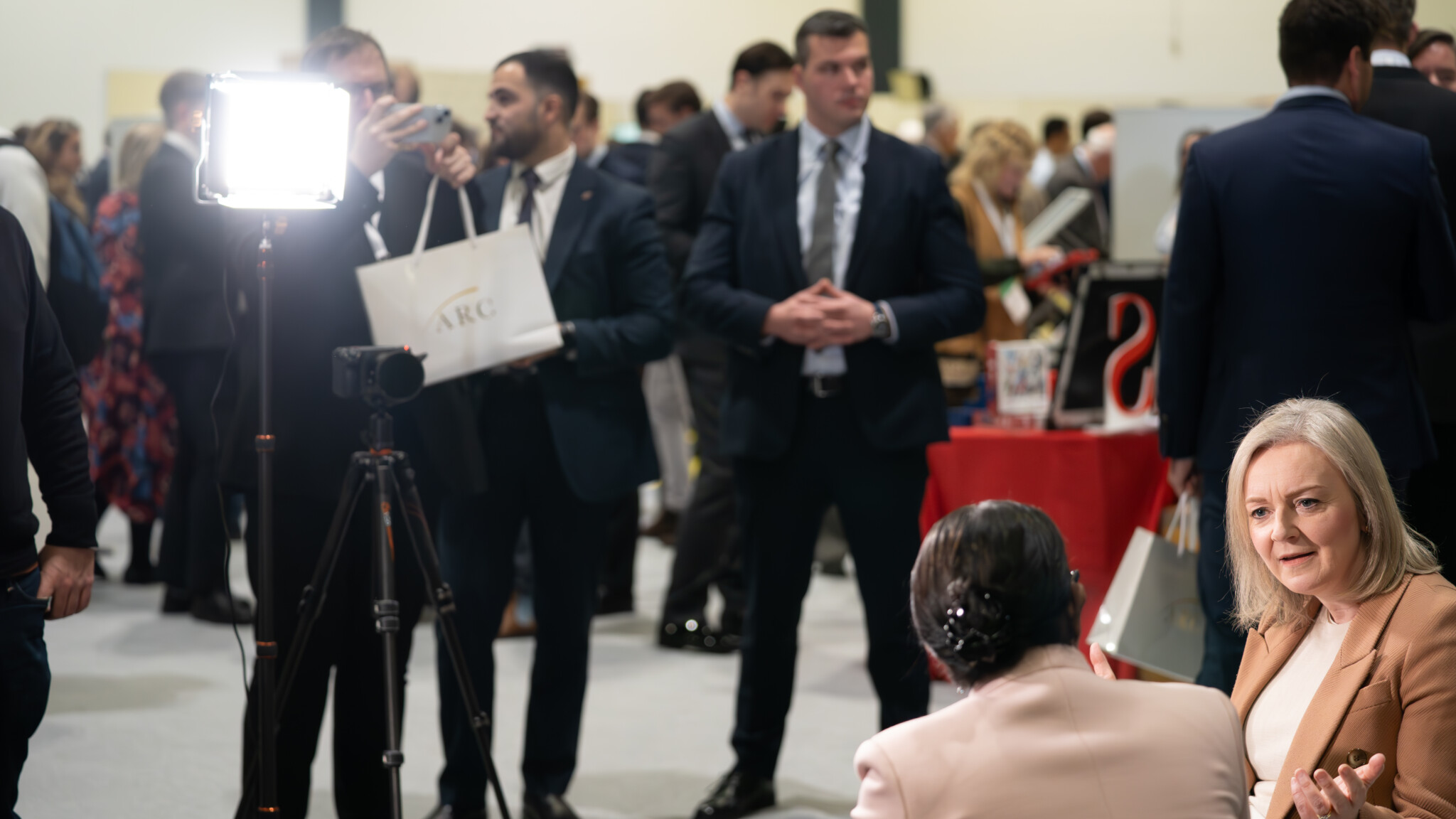
Previous Prime Minister of the UK and bestselling author Liz Truss being interviewed by Ayaan.
Courage Media were, therefore, grateful to be given a stand on the showfloor by Baroness Stroud, to continue these conversations with esteemed guests. Ayaan and I discussed the blueprint for dismantling Britain’s unelected deep state with former Prime Minister Liz Truss. I debated the basis of national identity with Andrew Gold, and why Trump should make Canada the 51st state with Eric Kaufmann. We were even given a few minutes of Jordan Peterson’s precious time. All will be released on this platform in due course. It was certainly an improvement on the first ARC to have so many media organisations and initiatives gathered together. It shows how we’ve managed to build a parallel economy and patronage network outside the Progressive hegemony (and saved introverts like me from having to make small-talk between sessions).
But one wishes that more of these contentious debates were held on the main and breakout stages. Issues like immigration and Islam were given conspicuously little attention. Talk of “shared values” and integration seemed antiquated in the age of unmanageable multiculturalism, particularly to the young people attending, who have never known anything but this diverse, divided world. There was a disconnect between some speakers, who still revere the ideas who brought us here, and the attendees, eager to address the taboo causes of Western decline.
The seismic shift in what is politically possible by President Trump’s executive orders was barely mentioned. If not for Konstantin Kisin, you would think Biden’s barely-coherent corpse was still in the White House. Others spoke as if our only option is to select our mode of managed decline. Now that we know “You can just do things”, listening to the stewards of Britain’s immiseration provide color-commentary on how something really must be done about all this rang hollow. There was no appetite for New York Times columnist David Brooks calling Trump “incompetent”. Such complaining about Trump’s character while doing nothing to stop Wokeism was defeated by popular vote last November.
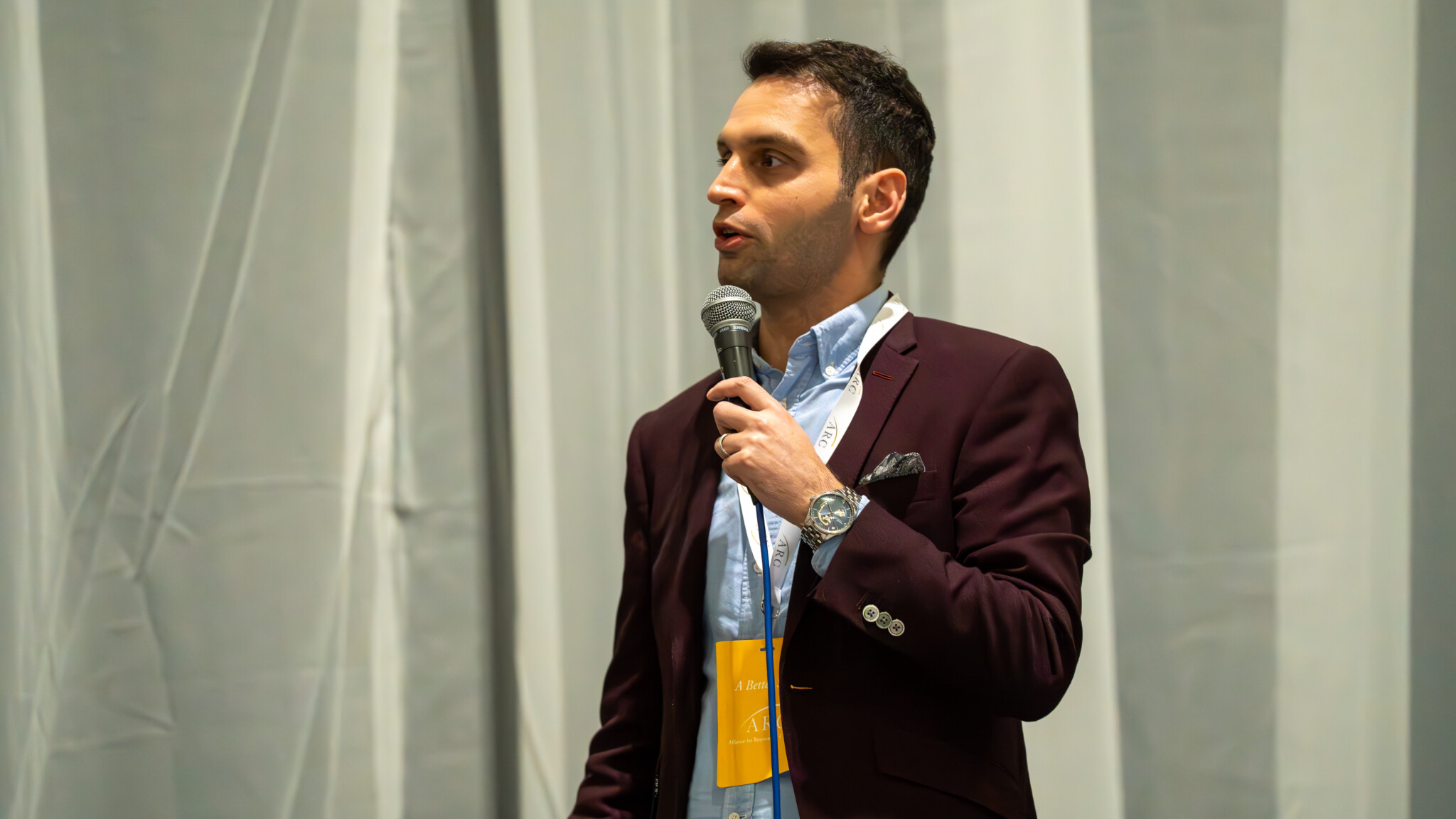
Konstantin Kisin speaking at the Young Leader’s Drinks Reception.
The same goes for the economic consensus of the last quarter-century. Later that day, at a much-praised debate on free trade and protectionism, the audience polled in favour of breaking away from global supply chain. But there was a feeling that the likes of Michael Gove — who once hosted Greta Thunberg in Parliament — was coming late to the party in concluding offshoring manufacturing and impoverishing Britain through net-zero policies is a bad idea. It often felt like converts were given access to the pulpit on their day in church, and so didn’t have robust solutions for the crises they contributed to.
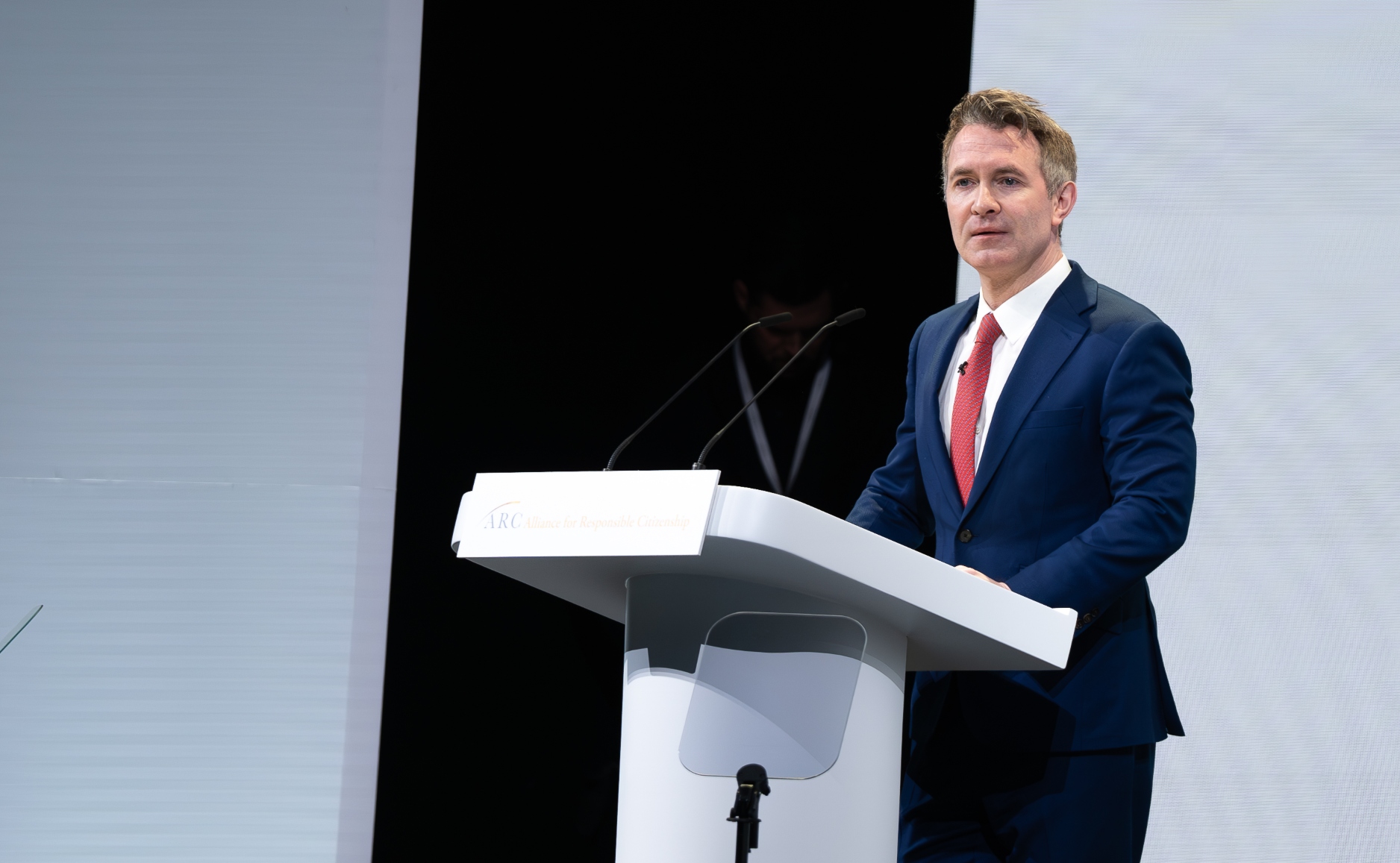
Douglas Murray delivering a keynote address at ARC earlier this week.
The need for civilizational renewal was made all the more apparent by the choice of venue. ARC relocated from the ugly-enough O2 Arena in 2023, to the ExCeL Centre in east London. Douglas Murray’s magnificent speech included an apology to ARC’s international guests for the brutalist Islamified ghetto which awaited them outside. He advised they venture further into the city to visit the architecture, parks, and museums of London proper, just a few miles away. But even that beautiful city has been rendered unsafe and unrecognizable by years of “antiracist” policing, and a subsequent increase in violent crime and thefts. The attitude has been that London alone was insufficient, and that exotic cultures must be imported until, according to Mayor Sadiq Khan, the indigenous population no longer represent the heterogeneous city. Instead, as Murray said, we should recognise that vanilla is a delicious flavor in its own right, and doesn’t need to be blended with every other in the parlor to be digestible.
But guests who took the cyberpunk-esque Elizabeth Line straight from Heathrow to the venue could be forgiven for not knowing what he was talking about. You could enter the labyrinthine ExCeL Centre thinking you had never left the airport. The convention space had the same long halls, white walls, exhausting LEDs, foreign staff, and chain restaurants as every other portal for global citizens. These wide-open spaces are a psychological assault on “Somewheres” who prefer the cozy low-ceilings of home. They induce a sense of subliminal dread — like a rat who strays too far from a safe corner in unfamiliar territory. Inside, attendees were shepherded through security, and through a one-way system to the lunch buffet by members of the Boriswave — some wearing balaclavas indoors. So untrustworthy were we, who had paid a significant sum to come, that cans of water were guarded like gold bars, and prohibited from being taken at any time before the allotted lunch hour started.
It takes an ahistorical, rootless personality type to enjoy such a space. As Harrington has previously written, the nomos and architecture of an airport enables “Anywhere” elites to believe the delusional anthropology of DEI ideology. The assumption that everyone is fundamentally the same, that all differences are due to arbitrary quirks of education or economic circumstance, and that we can therefore infer discrimination from disparities between groups, is enabled by the culture of the airport. If the international managerial class only interacts with other English-speaking, educated professionals, under the stringent surveillance of post-9/11 armed security, then they could be fooled into thinking all cultural differences are superficial and surmountable.
I fear this architecture of the convention centre contaminated some of the discussions at ARC. In her opening address, Conservative party leader Kemi Badenoch extolled the virtues of “British values” in allowing immigrants like herself to assimilate. (Granted, she is a good example of it — despite her insistence to hold open the door for more immigrants on the grounds she herself is one.) But the problem with “British values” is that you have to eventually get round to defining them, before setting them as the foundations for national identity. Badenoch notably did not.
Neither did her supporter, former Spectator editor Fraser Nelson. When pressed by Konstantin Kisin this week, Nelson could only suggest that being born in Britain makes you as indistinguishably British as those whose families can be traced back to the Battle of Hastings. The argument was prompted when Nelson said former Prime Minister Rishi Sunak is English, and dismissed the existence of Anglo-Saxon as a distinct ethnic group. Nevermind that Sunak himself identifies as British-Indian; or India, recognizing this distinction, celebrated his unelected installation as Prime Minister. This is not a standard for any country at any time except the post-War West practices — and is riddled with unworkable contradictions. By Nelson’s standard, Rudyard Kipling is India’s most famous poet. No wonder his own children disagree with it.
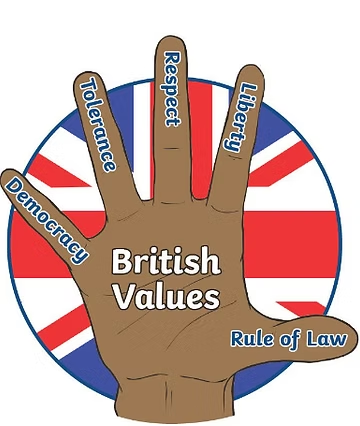
An image of a hand displaying the five “British values”.
“British values” are a contemporary fiction invented by the Department of Education in 2014: listing democracy, the rule of law, respect, tolerance, and individual liberty on the five fingers of a hand. In an effort to convince newcomers that these modish platitudes are incontrovertible goods, all traditional liberties have been trampled on. The British public voted to reduce migration in every election and referendum since 1974, and had their wishes disrespected with a record influx of net-tax dependents instead. To manage this rapid change in demography and culture, the police de facto criminalized microaggressions with non-crime hate incidents, while the Pakistani rape gangs were not prosecuted for fear of inflaming “community tensions”. Complaints about this two-tier policing, and the preferential treatment of Islam despite being the driving ideology for 94% of terror attacks since 1999, gets you labelled a “right-wing extremist” by activists in the civil service. Islamist extremism and racism against whites is tolerated; while protesters stabbed for burning a Quran, or Christians praying silently on street-corners near abortion clinics, are criminally charged. “British values” neither work, nor would be a necessary invention without the unwanted volume of migration.
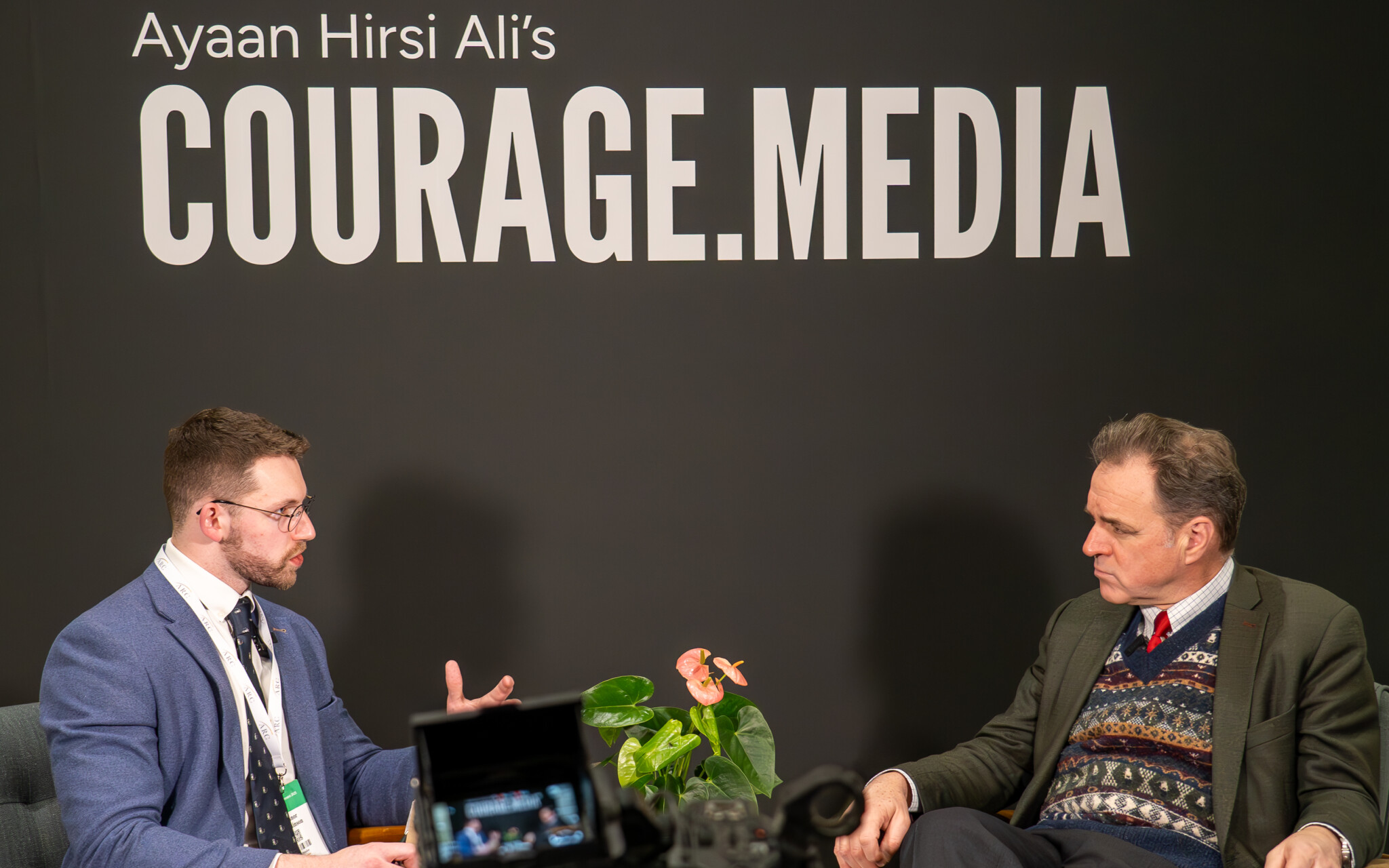
A photo of me interviewing Niall Ferguson. You can watch our full conversation below.
The argument is made that Britain, fractured by pluralism, needs a unifying narrative. Professor Niall Ferguson made this case at ARC: telling me that it will take politicians of immigrant heritage, like Kemi Badenoch, rather than “white men like us” to reinvigorate conservatism for a multi-racial nation. David Cameron declared “multiculturalism has failed” in 2015 — and then his colleagues continued to say “Diversity is our strength” for the next decade. (Hence why Ayaan had to remind them of this in her speech.) Thanks to record annual migration, a quarter of the population will be foreign-born by 2035, and largely from culturally-distant countries. As previous ARC research found, if present trends continue, Britain will become 54% first-generation immigrant by 2080. If majority-immigrant, what are newcomers assimilating into? Birth-rates among British natives are also falling — meaning different cultures are transmitted down the generational chain.
The contrary position was not platformed. Nigel Farage was not given a speech, despite a sizable poll lead (perhaps to avoid overshadowing Badenoch). Instead, Farage went beyond the bounds of a conversation designed to be confined to energy security with Jordan Peterson. He urged we halt the “population explosion” before immigration pushes infrastructure and culture beyond breaking point. While attendees applauded, I expect there was some bristling by legacy Conservatives in the VIP section.
But their “British values” integration plan is only possible in an airport departure lounge. The fluid lives of frequent flyers, left and right alike, encounter people with all shades of skin-tone — but everyone they know is highly literate, speaks English, and holds sufficiently cosmopolitan values to do business. This bubble is apparent to people my age: who went to school in the most ethnically diverse generation in British history. Most second-generation schoolmates of mine identified with the ethnicity and culture of their parents’ home countries. Most men on the young new-right went to state schools, lived in unremarkable boroughs of the Midlands, Kent, or Sussex, and have noticed how different making friends is with people of all backgrounds in the Anywhere-adjacent political scene.
In short: assimilation to “British values” is a luxury belief, which nobody below the age of thirty believes in. It isn’t feasible for the number of reluctant converts required to salvage social cohesion. Not only am I not content to consider myself politically obsolete: I am not so optimistic about convincing foreign nationals in unprecedented quantities to live by “our values” when they do not live around our people, and we do not practice them ourselves for fear of causing offence.
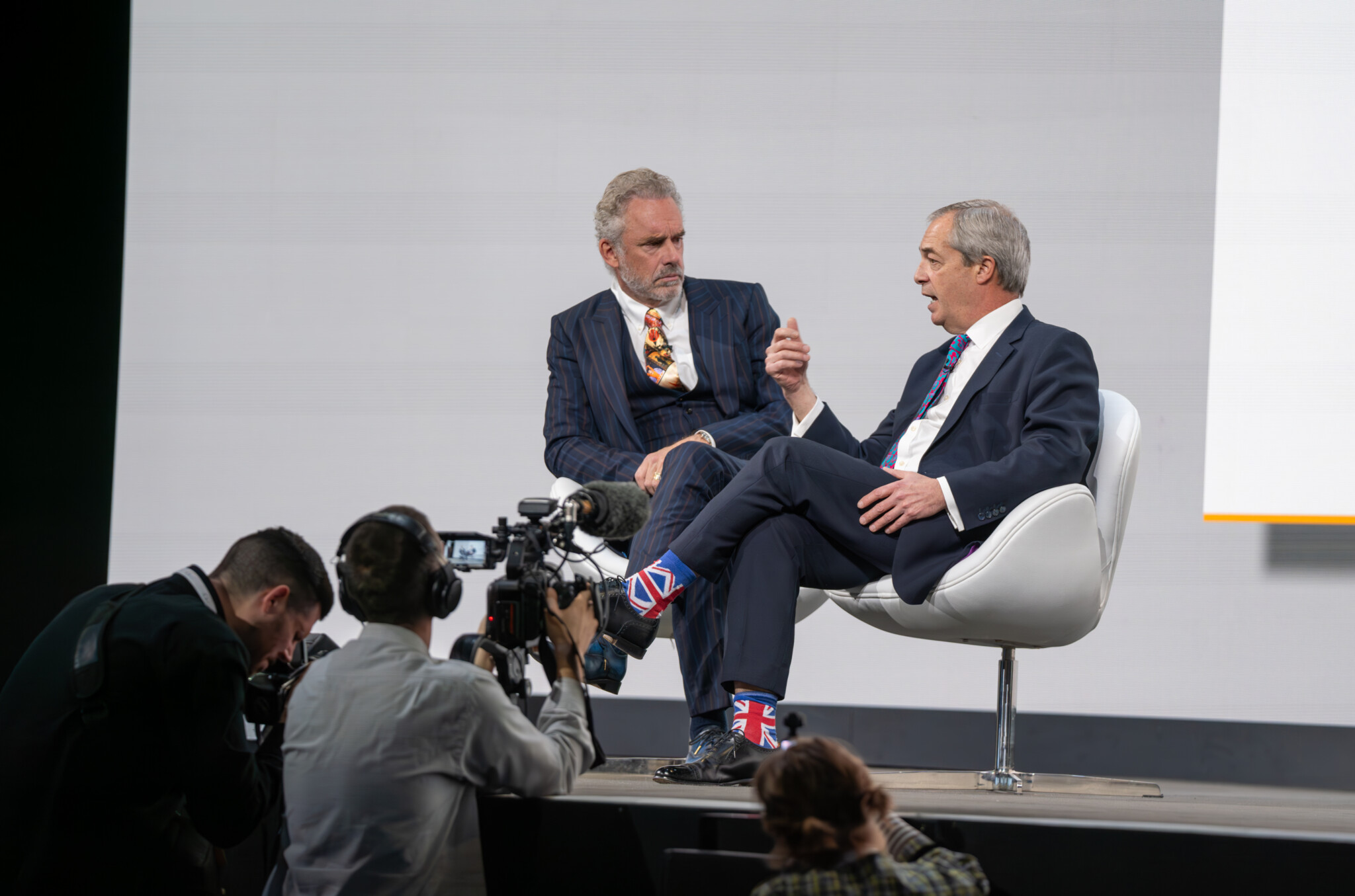
Jordan Peterson sitting down with Nigel Farage on Day Two of ARC.
And yet, amidst the ruins of Britain brought to us by the last government, Badenoch still insisted that real liberalism still has never been tried. I would suggest that our social atomization, state religion of egalitarianism, and liquidation of culture to avoid offending anyone is not the social software being “hacked” but rather being run on hardware it was never intended for. The technological and cultural conditions of Britain are completely different to when a few lettered Scots and Englishmen comprised the Enlightenment. What liberalism proper produces is a blanching of the architecture of Britain to resemble the soulless airport surroundings of the ExCeL Centre; and a unilateral disarmament of the host population against illiberal, imperial subcultures, until it resembles surrounding Newham.
And yet, amidst the ruins of Britain brought to us by the last government, Badenoch still insisted that real liberalism still has never been tried. I would suggest that our social atomization, state religion of egalitarianism, and liquidation of culture to avoid offending anyone is not the social software being “hacked”, but rather being run on hardware it was never intended for.
This is tacitly confessed to by Badenoch citing a microcosmic example of her ideal society: the Michaela Community School in Wembley. Run by “Britain’s strictest headmistress”, Katharine Birbalsingh, the school has its majority non-English student body sing the national anthem everyday. There’s no denying Birbalsingh’s method gets exceptional exam results. These organized renditions of “God Save the King” might encourage the children of immigrants to identify with their host nation. But the disciplinary measures taken to ensure students behave at Michaela show the enforcement costs necessary to force a fractured populous to act like a cohesive community. At Michaela, students are forbidden from talking not only in class, but when walking the corridors. To prevent Da’wah-inclined Muslim parents from demanding accommodations be made for their child’s religion, Birbalsingh has banned prayer of all kinds. As Birbalsingh told ARC, “That’s what you do to make multiculturalism work: you sacrifice things that are important to you.” This militant silence and secularism fosters conformity, but doesn’t cultivate a love of country. As a friend at ARC quipped, “I’ve never been to Belmarsh, but I suspect the inmates feel much the same. Michaela is a category-A experience.” Or, more accurately, it has a culture closer to an airport than a school.
As Robert Putnam observed two decades ago, diversity has deleterious consequences for social trust and cultural cohesion. The sacrifice made to “make multiculturalism work” appears to be an organic high-trust society. I vote that we simply stop importing indigestible tribal subcultures who aren’t inclined to assimilate in the first place, and spare ourselves the hassle. But this option appeared unthinkable to Tuesday’s panel on civilizational renewal: during which every member extolled the virtues of Christianity as a source of restoration, before answering a question on the growth of Islam with resignation to demographic realities which make the demise of the Christian West inevitable. Oh well then, we had a good run, I suppose. After all, we can’t propose any solutions which would offend the liberal sensibilities that have brought us to crisis point.
I might suggest we need not ban Sharia Law or establish a secular surveillance state if we simply stop importing such alien practices into Britain. In case you won’t take my word for it: Ayaan Hirsi Ali agrees. She didn’t leave Somalia to have racial communism and caliphates imposed elsewhere too. As Douglas Murray suggested, the agents of Western deculturation have plenty of other places to go. We don’t need to turn Britain into one big airport lounge to accommodate those who hate the traditions we hold dear. Rather than being bashful about everything that makes the West great, we should direct them to Heathrow, and hasten their departure.
I might suggest we need not ban Sharia Law or establish a secular surveillance state if we simply stop importing such alien practices into Britain. In case you won’t take my word for it: Ayaan Hirsi Ali agrees. She didn’t leave Somalia to have racial communism and caliphates imposed elsewhere too.
We must be unwavering warriors for the principles, history, heritage, and Christian faith which are the property of the peoples whose nationality we prefix before “values”. This inheritance is ours, and we shouldn’t compromise on or forfeit it in the hopes of appeasing those who don’t want to belong. ARC is a great opportunity to build that platform of unapologetic civilizational renewal. It has already shown its ability to bring great minds together, and publish thought-provoking papers. But existential threats must be addressed, with more than just a resignation to unwanted change, if ARC is to be an oasis in our desert of deculturation — and not a mirage.
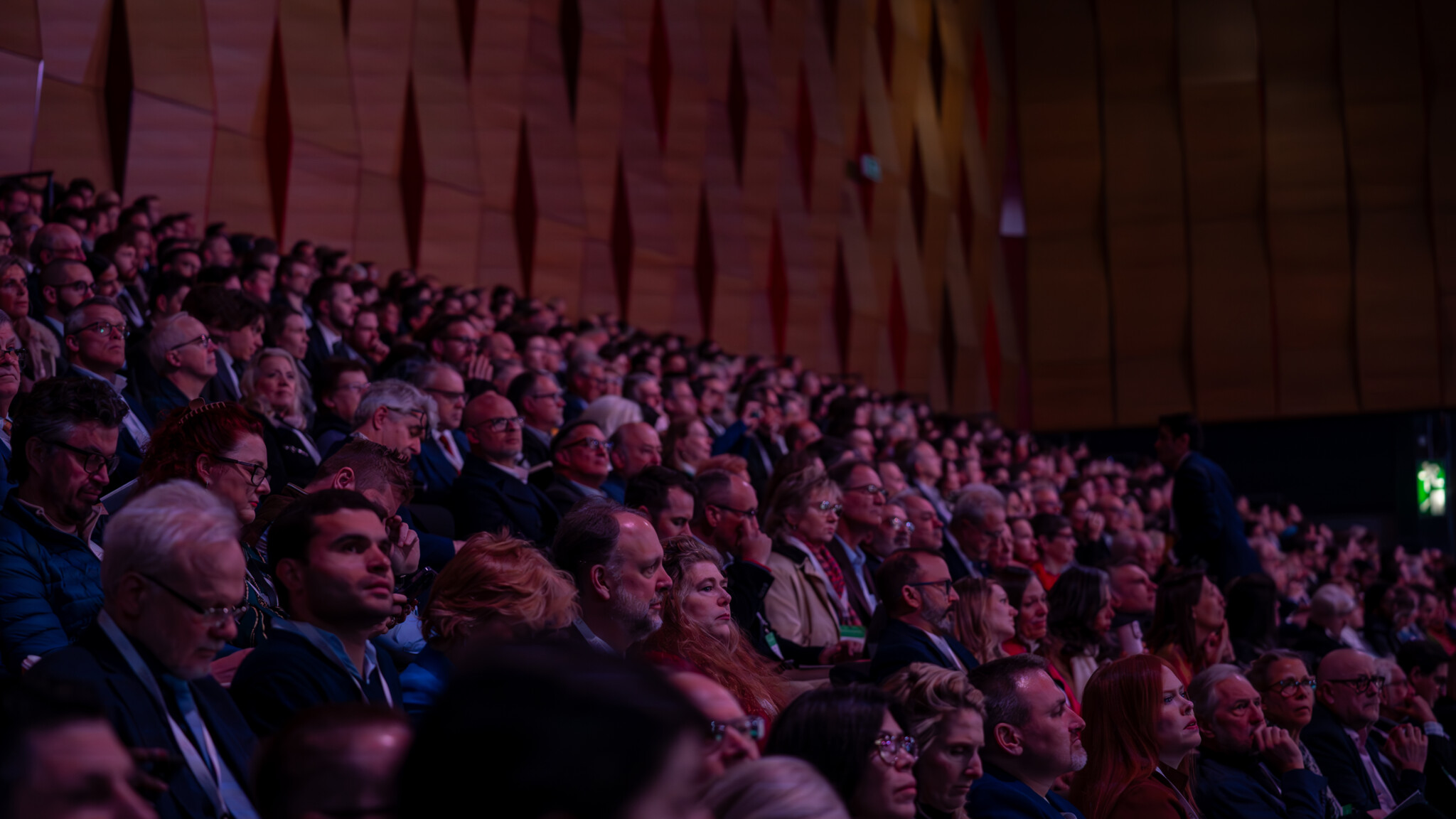
Thousands were seated to watch the keynotes in the auditorium this week.




Comments (1)
Only supporting or founding members can comment on our articles.